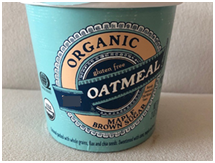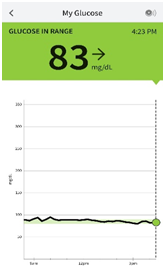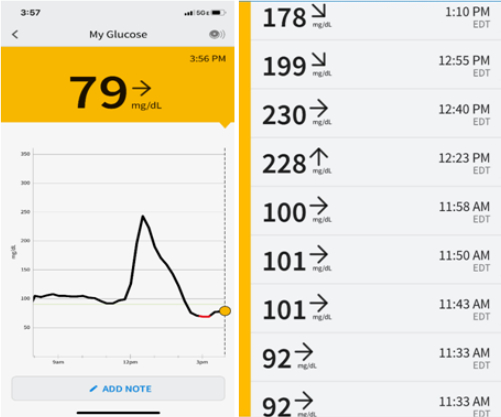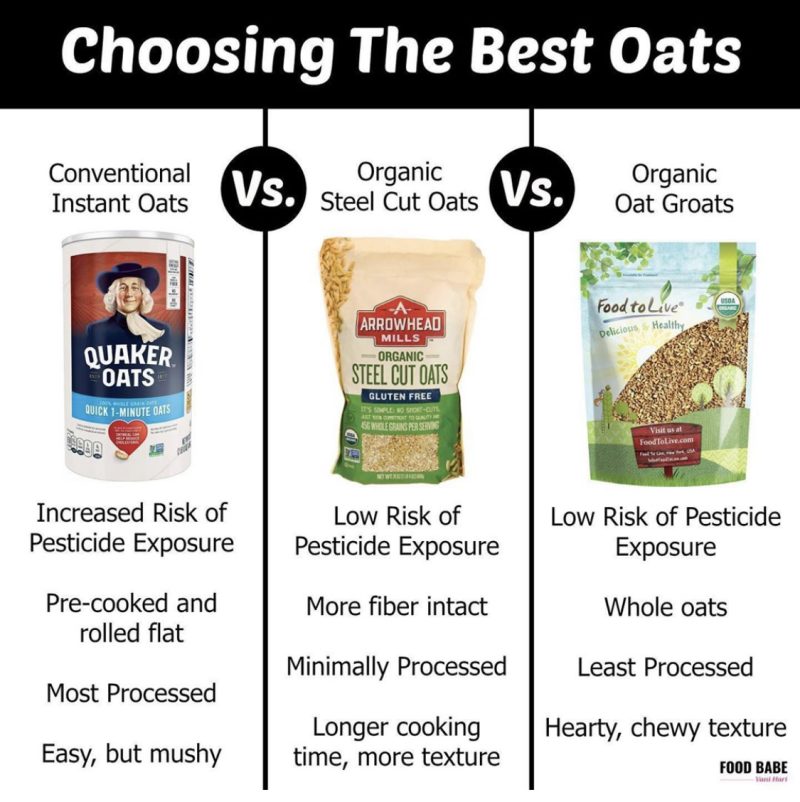For a long time, doctors, nutritionists, and dietitians have touted oatmeal as one of the best options for breakfast. What they have failed to take into account is the other effects of oatmeal on our body. Just because a food has been shown to lower cholesterol, it does not mean it is great for us. What if a specific food lowers our cholesterol but increases our blood sugar, increase our chances of being diabetic, or puts stress into our immune system – would you still consider that food healthy?
People have been switching their breakfast to oatmeal because these healthcare providers have been telling us that it could help lower cholesterol and it is a healthy food.
While oats may have health benefits, there may also be a down-side to them. So, it depends…
What is more important…taking advice from doctors and nutritionists who advice you to eat oatmeal based on outdated and siloed information from what they learned in school years ago or you taking control of your own health and using the latest science and tests (that I share here) yourself in real time to know if oatmeal is ACTUALLY GOOD for YOU?
How Do Different Carbohydrates Affect the Body?
Much of the latest research suggests that major health issues like obesity and metabolic disease might actually be caused by the types of carbohydrates we eat and not by how much we eat.
So, which types of carbohydrates should we be eating?
The answer is high-quality carbs from “real foods” with a low glycemic index. These are the ones that don’t elicit an immediate elevation in blood sugar levels. [1][2]
I wanted to find out for myself how oatmeal, which is considered a healthy breakfast food, would react with my body…
My Experiment with Oatmeal
As most of my readers know, I am a biohacker who is constantly testing, monitoring, analyzing ways to improve my physical and cognitive health.

I wear a CGM monitor (that tracks the glucose level in my blood) regularly because I have been curious to see what foods affect my blood sugar and stresses my body. I wanted to try one of the healthiest and most common flavors of oatmeal that the general population eats to see how it would react with my blood sugar level.
I chose a gluten-free and organic oatmeal for my experiment.

This is what my average daily blood sugar reading looks like on the CGM monitor (this is a reading from 8am – 4pm on an average day) …. My blood sugar is usually very consistent even after eating food.
This is what happened after I ate oatmeal at around 11.40 am. Imagine my surprise when it took me until 2.30pm to get my blood sugar back to my normal level! My blood sugar went up 250% just by eating that one oatmeal package! It took my body 3 hours to get the blood sugar level back to my normal level!

What Causes Oats to Increase Glucose Levels?
Cooking oats in water gelatinizes starches causing them to be digested more rapidly which leads to an increased glycemic response. Additionally, the whole cooking-in-water process solubilizes β-glucan which is normally responsible for reducing the glycemic response of oats. When glucose is absorbed into cells too fast, it can cause hormonal as well as metabolic changes.
What Do These Results Mean for You?
Unless you are actively monitoring your sugar level, you may be eating oatmeal under the false presumption that it is good for you!
You may or may not have realized or known that this “supposedly” healthy oatmeal could be driving up your blood sugar level to pre-diabetic levels!
Some people may dismiss a specific discomfort after eating oatmeal because they think that feeling a specific way is “normal”….normal for them may be feeling bloated, burping, feeling hungry in a few hours, feeling a little lethargic, or having an energy crash and needing caffeine after…
Others may not show any external symptoms at all after eating oatmeal.
Oatmeal also gives me an unhealthy quick sugar energy spike which was then followed by an energy crash!
If you need energy for the day, this is not the healthy way to provide energy for your body. What you need is food that gives you consistent energy throughout the day without rollercoaster highs and lows – spiking and stressing your body’s blood sugar levels and organs that are trying to digest and process the food you eat.
The more you stress your digestive system, the more your immune system gets weak and makes you prone to diseases and illnesses.
Imagine all the people eating oatmeal thinking it is good for them…Imagine all the diabetic and obese people eating oatmeal thinking they are lowering their cholesterol level… instead they are spiking up their sugar levels to dangerously high levels!
Some people add dried fruits and sometimes maple syrup to eat their oatmeal – this is even more sugar that is being added into our blood stream!
Best approach to Eating Oatmeal and ANY type of food!
Each one of us have very unique individual nutritional needs. The food that is good for you may not be good for my body; vice versa, the food that is good for my body may not agree well with your body based on your health, nutritional needs, and gut microbes.
There are several ways for you to see if a specific food is good for you or not…
1. The simplest way is to do a food elimination process. Eliminate a specific type of food from your diet for at least a week. Then, add it to your diet and be aware of how you feel (with all other conditions equal):
a. How do you feel? Lethargic? Bloated? Energized? Do you burp or fart more?
b. How does it affect your sleep?
c. How does it affect your mind, moods, and mental clarity?
These are good gauges to simply test if a specific food agrees with you or not.
However, not all foods may show obvious external signs that you could detect on your own! In those cases, I recommend doing one or several of these tests…
2. Food sensitivity test
3. DNA food test
4. Get a prescription from your doctor for you to use a CGM to measure how different food affects your blood sugar
What do the Experts Say About Oats?
Mark Sisson says: “Oatmeal is a perfect example of the essentially tasteless, but oddly comforting food that’s difficult to give up (judging from all the emails I get). It’s tough to explain, because it’s not like oatmeal is particularly delicious. It’s bland, unless you really dress it up. Better than wheat, worse (and more work to improve) than rice. There are numerous other food options that are superior to oats, and I don’t dig the weird headspace they gave me, but I’ll admit that they aren’t as bad as wheat.”
Dr. Mark Hyman labels oatsas one of the “forbidden carbs” that he recommends you stay away from. He goes on to say that: “The glucose spikes your blood sugar, starting a domino effect of high insulin and a cascade of hormonal responses that kicks bad biochemistry into gear. The high insulin increases storage of belly fat, increases inflammation, raises triglycerides and lowers HDL, raises blood pressure, lowers testosterone in men, and contributes to infertility in women.”
Dr. David Perlmutter suggests that oats might not be a good idea for breakfast as the “products may be contaminated with wheat, barley, or rye during harvesting, transporting, milling, and processing.”

Conclusion
Oatmeal most likely may not be good for you unless you test and find out. You be putting your health and wellness at unnecessary risk – with the false presumption that you are eating healthy and listening to outdated and siloed doctors, nutritionists, and dietitians!
Be the CEO of your own health and use the information I share to empower yourself and take proactive steps to improve your health so you could enjoy a high quality of life for years to come!
References:
1. Kresser,C. (2005). RHR: Is the Glycemic Index Useful?
2. Drhyman.com. Slow Carbs, Not Low Carbs: The Truth about Low-Carb Diets
3. Ludwig, D. S., Majzoub, J. A., Al-Zahrani, A., Dallal, G. E., Blanco, I., & Roberts, S. B. (1999). High glycemic index foods, overeating, and obesity. Pediatrics, 103(3), e26-e26.
4. Raben, A., Tagliabue, A., Christensen, N. J., Madsen, J., Holst, J. J., &Astrup, A. (1994). Resistant starch: the effect on postprandial glycemia, hormonal response, and satiety. The American journal of clinical nutrition, 60(4), 544-551.
5. Rebello, C. J., Johnson, W. D., Martin, C., Johnson, J., O’Shea, M., Chu, Y., & Greenway, F. L. (2018). Effect of Two Oat-based Cereals on Subjective Ratings of Appetite. Current topics in nutraceutical research, 16, 113-120.


